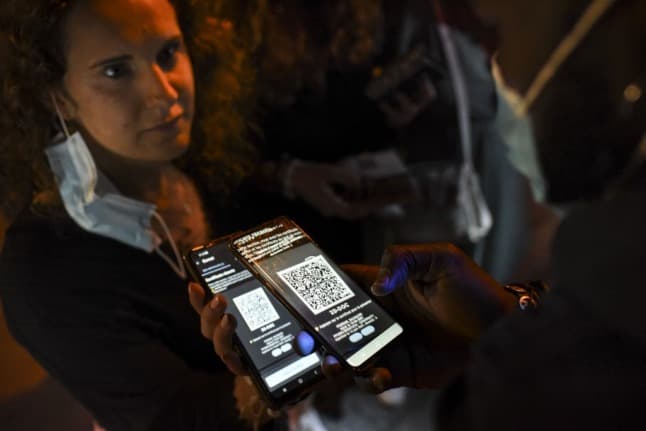When, where and why you need a health passport in France

As France faces a Delta variant-driven fourth wave of Covid-19, people are now required to carry a health passport to visit cultural or leisure venues, cafés, bars and on long-distance train or bus travel. Here's when and where you will need the passport.
The pass sanitaire, as health passports are known in France, proves that the bearer has either been fully vaccinated against Covid-19, has already recovered from the virus having tested positive more than eleven days and less than six months ago, or has received a negative test result in the past 48 hours.
Where it's required
From July 21st, health passes have been required to enter public cultural and leisure venues such as theatres, cinemas, libraries, theme parks, concert halls, festivals, swimming pools or leisure centres, museums and monuments.
From Monday, August 9th they are also required to enter bars, cafés, restaurants (even if you are sitting outside) larger shopping centres and for long-distance train or bus travel and domestic flights. they are also required for visitors to hospitals and care homes and to access routine hospital appointments.
For a full list of venues where the pass is required, click HERE.
The rule applies to both visitors and employees of these venues, but employees have until August 30th to be fully vaccinated.
Chilren aged between 12 and 17 also have an exemption until September 30th, to allow families time to get their children vaccinated.
Face masks will no longer be required in venues where the health passport is in use, unless required by local decrees.
READ ALSO: ‘I’m a barman, not a policeman’ – French café owners call for delay in implementing health passports
Why it's being expanded
President Emmanuel Macron defended the tightening of the restrictions after earlier pledging that the health pass would not be required for "everyday activities" by saying he was trying to strike a balance between “protection and freedom, between protecting lives and reopening the country”.
Expanding the use of the health pass was the best way to achieve that balance, he said.
43 of France's 96 mainland départments had surpassed the alert level of 50 cases for every 100,000 inhabitants on Tuesday, as France attempts to limit the effects of a fourth Covid wave.
For vaccinations, health passes become valid seven days after the second dose. The same period is in force for those who have recovered from Covid-19 and have had a single booster dose of vaccine.
For the single-dose Johnson & Johnson vaccine, known as Janssen in France, the period is four-weeks.
From August 9th, health passes will be required to enter cafés, restaurants, bars, certain shopping centres, hospitals or nursing homes as a visitor, and long-distance travel on trains, planes or coaches.
Those aged between 12 and 17 have until September 30th to be vaccinated before health pass rules apply to them.
Comments (8)
See Also
The pass sanitaire, as health passports are known in France, proves that the bearer has either been fully vaccinated against Covid-19, has already recovered from the virus having tested positive more than eleven days and less than six months ago, or has received a negative test result in the past 48 hours.
Where it's required
From July 21st, health passes have been required to enter public cultural and leisure venues such as theatres, cinemas, libraries, theme parks, concert halls, festivals, swimming pools or leisure centres, museums and monuments.
From Monday, August 9th they are also required to enter bars, cafés, restaurants (even if you are sitting outside) larger shopping centres and for long-distance train or bus travel and domestic flights. they are also required for visitors to hospitals and care homes and to access routine hospital appointments.
For a full list of venues where the pass is required, click HERE.
The rule applies to both visitors and employees of these venues, but employees have until August 30th to be fully vaccinated.
Chilren aged between 12 and 17 also have an exemption until September 30th, to allow families time to get their children vaccinated.
Face masks will no longer be required in venues where the health passport is in use, unless required by local decrees.
READ ALSO: ‘I’m a barman, not a policeman’ – French café owners call for delay in implementing health passports
Why it's being expanded
President Emmanuel Macron defended the tightening of the restrictions after earlier pledging that the health pass would not be required for "everyday activities" by saying he was trying to strike a balance between “protection and freedom, between protecting lives and reopening the country”.
Expanding the use of the health pass was the best way to achieve that balance, he said.
43 of France's 96 mainland départments had surpassed the alert level of 50 cases for every 100,000 inhabitants on Tuesday, as France attempts to limit the effects of a fourth Covid wave.
For vaccinations, health passes become valid seven days after the second dose. The same period is in force for those who have recovered from Covid-19 and have had a single booster dose of vaccine.
For the single-dose Johnson & Johnson vaccine, known as Janssen in France, the period is four-weeks.
From August 9th, health passes will be required to enter cafés, restaurants, bars, certain shopping centres, hospitals or nursing homes as a visitor, and long-distance travel on trains, planes or coaches.
Those aged between 12 and 17 have until September 30th to be vaccinated before health pass rules apply to them.
Join the conversation in our comments section below. Share your own views and experience and if you have a question or suggestion for our journalists then email us at [email protected].
Please keep comments civil, constructive and on topic – and make sure to read our terms of use before getting involved.
Please log in here to leave a comment.